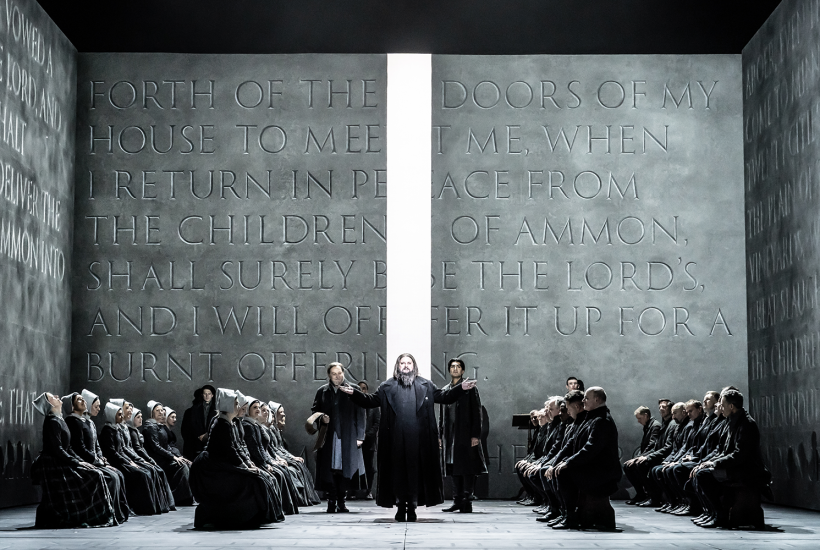London’s two opera houses have been busy staging non-operas. Handel’s English oratorio, Jephtha, is his final exercise in a form that only existed because it was, explicitly, not opera (Georgian theatres needed something to play during Lent). We know better today, and dramatised reboots of Handel oratorios are proliferating, possibly because – unlike his actual operas – they give the chorus something to do. Katie Mitchell directed Theodora at Covent Garden last year. Now Oliver Mears has had a bash at Jephtha and has encountered the same basic problem. Operas seduce; oratorios preach. These are explicitly Christian, implicitly patriotic works, and what self-respecting contemporary director could allow that?
It was an act of artistic self-hatred that pandered to every snobbish prejudice about opera
It’s clear from early in Mears’s staging that he lacks the vocabulary – and possibly the will – to make historical or human sense of this particular story. True, Old Testament morality can be a little on-the-nose, and you can appreciate why a director might want to tease out some complexity. But Mears simply inverts good and bad and imposes a funkier set of moral binaries. (In that respect, at least, it’s very much a Jephtha for the modern day). The wicked Ammonites are portrayed (briefly) as Hogarthian hipsters, a colourful bunch who are totally cool about cross-dressing. The Israelite Jephtha (Allan Clayton) is the bullying, misogynistic leader of a Puritan sect from an earlier century, or possibly just from Channel 4. The libretto refers to Gilead, so the women all wear Handmaid’s Tale bonnets. We could do with a moratorium on that particular cliché.
In fairness, it’s superbly realised. Simon Lima Holdsworth’s designs are imposing: massive stone slabs inscribed with Biblical texts frame the action and tower over the characters, by turns brooding or fiery under Fabiana Piccioli’s lighting. Laurence Cummings brings depth and dignity in the pit. Still, it never seems to generate the electricity you’d expect from a cast that includes Alice Coote (Storgè), Brindley Sherratt (Zebul) and Jennifer France (Iphis). Possibly I came on a bad night. France stood out, as she often does; luminous and brave. Clayton articulated his words with exemplary clarity and colour, entering wholeheartedly into Mears’s unlikeable interpretation of what ought to be a heroic role. Jephtha’s sublime ‘Waft Her, Angels’ was intensely poignant, which of course, in this staging, made it a nonsense: a moment of self-indulgent sentimentality from a brute.
The ending, inevitably, is a car crash, as the director’s cynicism collides with music that exalts divine mercy (Kaelan O’Sullivan sang masterfully as the angelic deus ex machina) with every resource at Handel’s command. We’re asked to agree that a life dedicated to a benevolent (and as we’ve seen, unambiguously real) Jehovah is worse than being burned alive. Jephtha, meanwhile, goes mad. I think: I don’t actually know, because Mears puts the chorus into the audience for the final scene and from the side of the stalls it was impossible to see the stage.
Still, better a million staged Jephthas than the gilded turd of a vanity project that the ENO presented under the title 7 Deaths of Maria Callas. This bizarre multimedia spectacle wasn’t about Callas at all, but rather its creator; the performance artist Marina Abramovic. She lay motionless in bed for much of the evening, while seven singers (good ones, including Nadine Benjamin and Sophie Bevan) sang seven arias, dressed as servants – an accurate representation of the role of music in Abramovic’s conception. Behind them played videos starring Abramovic and Willem Dafoe, generally in slow motion. Abramovic threw herself off a skyscraper to ‘Vissi d’arte’; Dafoe draped live snakes around her neck to the strains of Verdi’s ‘Otello’. Imagine the world’s longest perfume advert. ‘I am a flickering flame on a lonely candle’ intoned Abramovic, in a voiceover. The snakes seemed unmoved.
You can see why the ENO might have thought this would be a worthwhile collaboration. The company’s openness to the wider world of contemporary culture is commendable, and Abramovic is a big name, after all. But this was just grotesque – and all the more so for being so skilfully realised, with Yoel Gamzou conducting the full ENO orchestra. Later, Abramovic wandered around a replica hotel room smashing things before the singers returned, still dressed as skivvies, to clean up her mess. They were permitted bows at the end, and I took heart from the cheers that greeted Sarah Tynan, whose singing of the Lucia di Lammermoor mad scene had blazed through the nonsense on all sides.
Then Abramovic took her bow – now wearing a huge, glittering gold frock – and the audience exploded (the costume designs were credited to ‘Riccardo Tisci for Burberry’). 7 Deaths of Maria Callas was theatre as fashion statement; an act of artistic self-hatred on ENO’s part that pandered to every snobbish, facile and tasteless prejudice about the art of opera. Clearly, there’s an audience for that sort of thing.
Got something to add? Join the discussion and comment below.
Get 10 issues for just $10
Subscribe to The Spectator Australia today for the next 10 magazine issues, plus full online access, for just $10.
You might disagree with half of it, but you’ll enjoy reading all of it. Try your first month for free, then just $2 a week for the remainder of your first year.








Comments
Don't miss out
Join the conversation with other Spectator Australia readers. Subscribe to leave a comment.
SUBSCRIBEAlready a subscriber? Log in